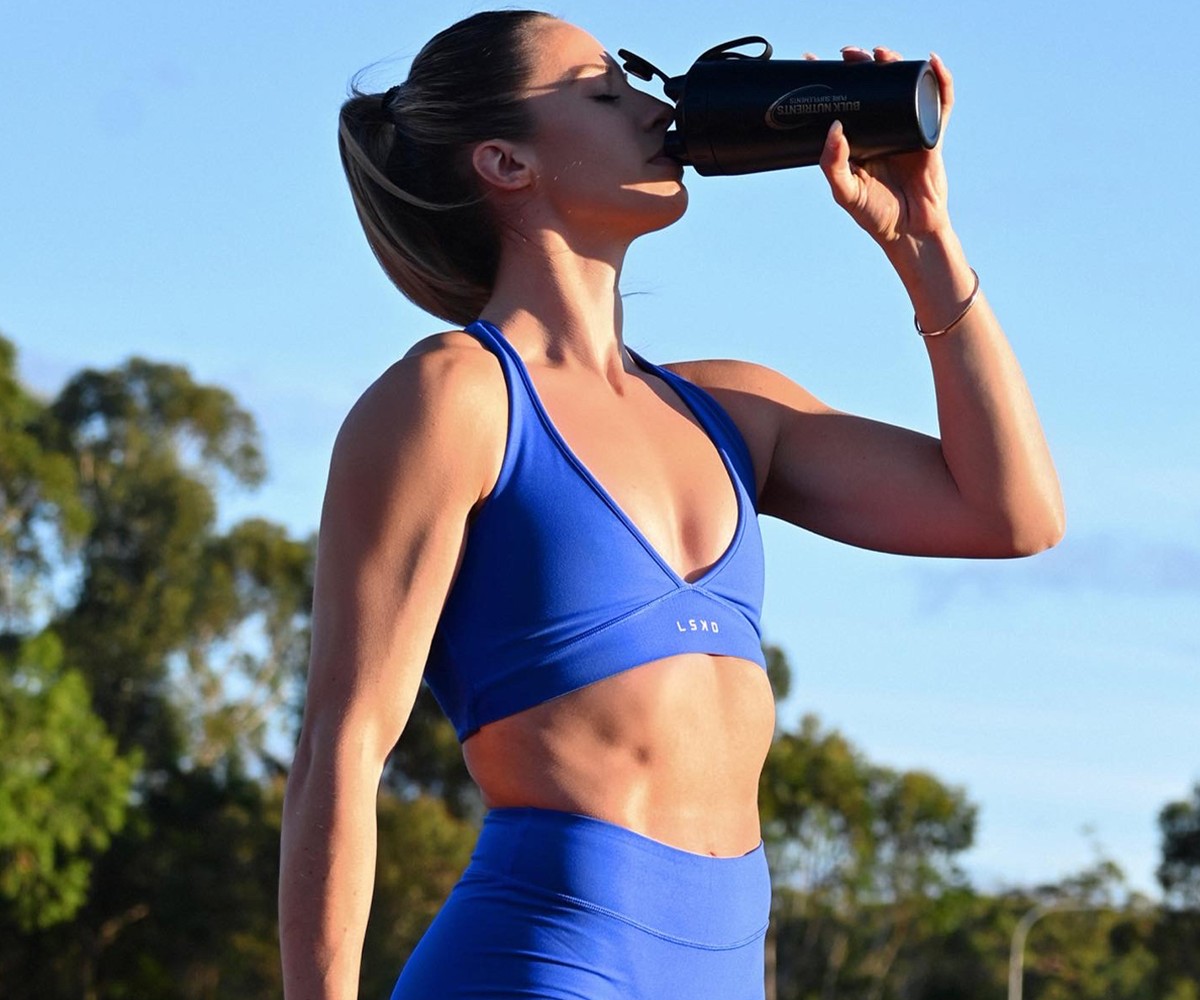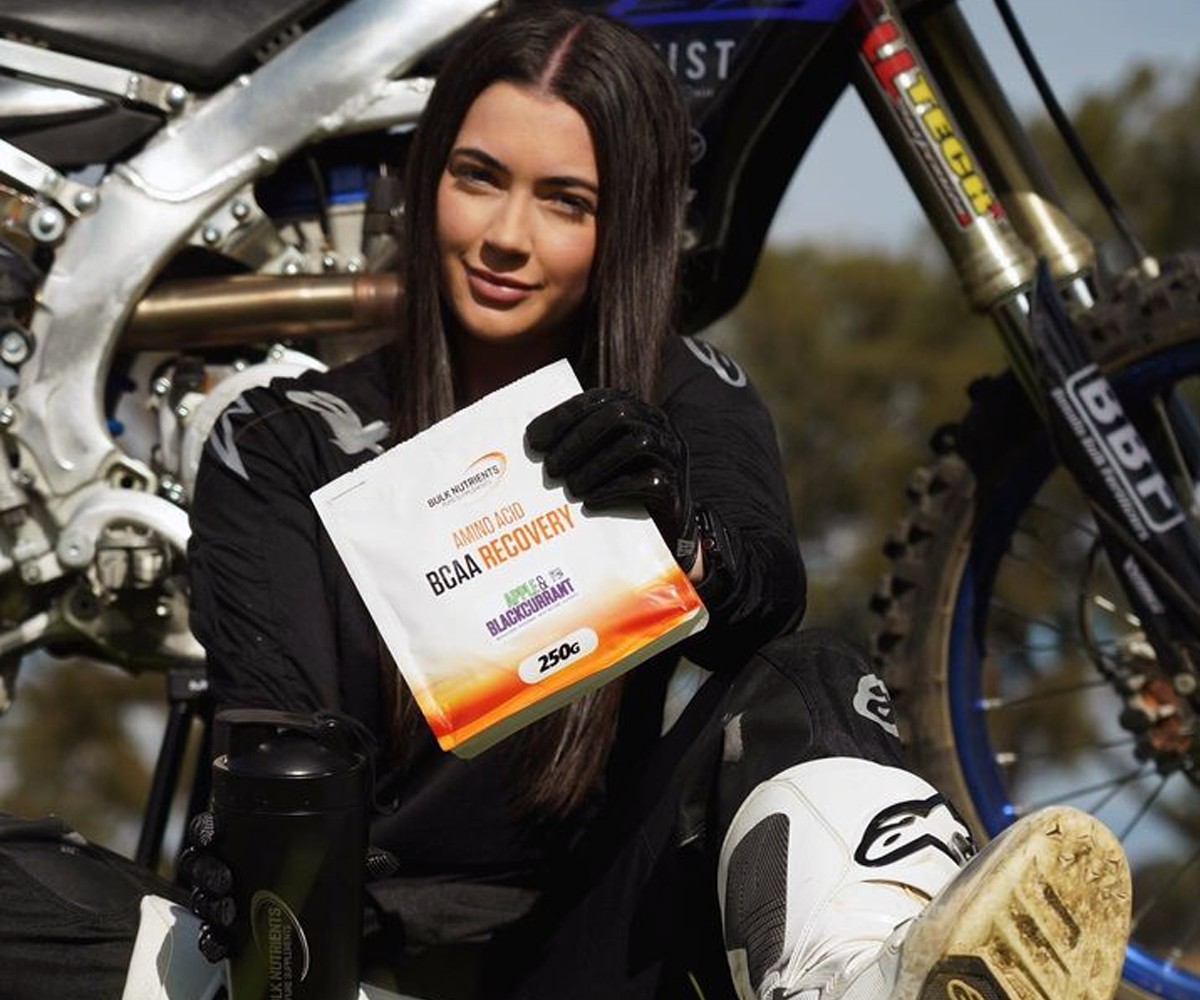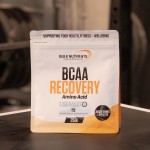BCAA Recovery Extended Product Information

Scienticially formulated BCAA Recovery
BCAA Recovery has been formulated by Bulk Nutrients to provide the largest dose of BCAAs at the most scientifically verified ratio possible (2-1-1). The dose of 10,000mg per serve according to research should be effective for people up to 100kgs (at a suggested dose of 100mg per kg of bodyweight). This amount of BCAAs is 33% more than a leading brands blend.
At Bulk Nutrients, we believe this combination of BCAAs, Citrulline Malate, Vitamin B6, and Electrolytes will reduce muscle recovery time, reduce soreness, maximise muscular retention, so you can train harder and sooner which should yield better long terms effects in strength and muscle mass.
Each 13.7g serve of BCAA Recovery contains:
- 10g BCAA consisting of:
- 5g Leucine
- 2.5g Isoleucine
- 2.5g Valine
- 2.5g Citrulline Malate
- 600mg Vitamin B6
- 600mg Sodium Chloride
- 140mg Potassium Chloride
When we were set to revise our BCAA blend recently, we looked to the market to what was available, as well as cross referencing as much research as we could find on BCAAs and their benefits.

The first question was: Is there a magic ratio of BCAAs as it seems like its changing all the time?
In this case, the facts are simple, BCAAs in the 2-1-1 ratio have been used in more research studies than any other ratio, commonly claimed to have greater benefits. The following article references studies utilising BCAAs at or near the 2-1-1 ratio.
In our opinion higher ratios of Leucine mainly exist so companies can save money. Our BCAAs we have formulated at the most scientifically validated ratio, so you get your necessary Leucine, (5g per serve) along with 2.5g of Isoleucine and 2.5g of Valine. Keep in mind that while ratios of 4-1-1 and 10-1-1 contain more Leucine per dose, they greatly reduce the amount of both Isoleucine and Valine available, which means they have very little (if any) transfer to research studies which were done on BCAAs in the 2-1-1 ratio.
You may be surprised to hear this from a supplement company but the benefits of BCAAs are a little overblown by some. Although some research exists which demonstrates their benefits on strength, the real benefits of BCAAs are around their ability to reduce muscle soreness, a better retention of muscular force – which means you can train harder, sooner and a reduction of Creatine kinase, all of which are positives for muscle recovery.
Let’s look at some studies:
Note, this study used a dose of 7.3g divided into 4 doses. Muscle soreness increased after exercise and was 64% reduced in BCAA supplemented group when compared to the placebo group.
Note, this study used 10g doses twice a day (for a total of 20g a day dose). In this study researchers found the following: Reduction of delayed onset muscle soreness up to 96hr’s afterwards, peaking at 24hr’s. Better retention of maximal muscular force up to 96hr’s after exercise, peaking at 24hr’s. Reduced creatine kinase – peaking at 24hr’s, Creatine Kinase is a food indicator of muscle damage.
While many studies have been done, ranging from 20G + a day to 5.5g, a dose of BCAAs based on 0.1g per kg of bodyweight seems an ideal medium between results and minimising wastage.
This study used doses of 5.5g, as test subjects weighed approximately 55kg. Serum BCAA concentrations reduced in those using placebo after exercise. Supplemented groups values were 2.2 times higher. Reduced the peak time of muscle soreness (2-3 days after exercise) in young women by about 45% when compared to the placebo.

Once the question of how much was needed was out of the way, we asked is there a way to make BCAAs even better?
Well yes, it’s Citrulline Malate. Citrulline Malate has demonstrated to reduce muscle soreness (so it works very well with BCAAs) while actually increasing the body’s ability to utilise BCAAs. This study was on Citrulline Malate’s effects on Amino Acid absorption: Note, this study uses a 6g dose.
L-citrulline-malate supplementation can enhance the use of amino acids, especially the branched chain amino acids during exercise and also enhance the production of arginine derived metabolites such as nitrite, creatinine, ornithine and urea.
Citrulline Malate has also shown to increase muscular endurance (which means better training sessions) as well as increasing ATP oxidation during exercise while reducing muscle soreness.
More studies can be found here:
Study using an 8g dose where researchers found: The number of repetitions showed a significant increase from placebo treatment to CM treatment from the third set evaluated (p <0.0001). This increase was positively correlated with the number of sets, achieving 52.92% more repetitions and the 100% of response in the last set (S4’). A significant decrease of 40% in muscle soreness at 24 hours and 48 hours after the pectoral training session and a higher percentage response than 90% was achieved with CM supplementation.
Study using a 6g dose CM ingestion resulted in a significant reduction in the sensation of fatigue, a 34% increase in the rate of oxidative ATP production during exercise, and a 20% increase in the rate of phosphocreatine recovery after exercise, indicating a larger contribution of oxidative ATP synthesis to energy production.
The problem with most supplements, at least till now is that they utilise Citrulline Malate in tiny doses. With all successful studies utilising doses of at least 6g, it’s unlikely that a dose of 1g is going to make a difference.
In BCAA Recovery, we utilise a dose of 2500mg (of the more powerful 2-1 Citrulline Malate), which means if this product is taken in conjunction with our Pre Workout 101, you’ll be getting 6000mg of Citrulline Malate (which is the dose verified in studies). You have to beg the question, if you are only taking 1g a day (which is what many supplements have in them, can you expect to get the same results as those in studies which used 6000mg a day?
It’s a bit like reading an article which says you should take 180g of protein a day for gains and then taking 30g, not only would you not gain muscle, you’d go backwards very quickly!
From there, we have added clinically verified doses of electrolytes, Sodium and Potassium with Vit B6 to ensure a true recovery formula.
Relatively small amounts of sodium (19.9 mmol/L) in a sport drink consumed at a rate equal to body mass change effectively prevented the decrease in plasma sodium concentration typically observed when sodium-free fluids are ingested during prolonged exercise. Additional sodium intake did not confer further advantage under these specific conditions.

What about Glutamine?
You’ll notice a few BCAA recovery blends include Glutamine in tiny doses. While Glutamine is a necessary amino and one that can have a significant effect on recovery, in people with decent protein intakes it is very rarely required.
Consider that with a decent diet, which includes a few protein shakes a day you’ll be taking over 20g of Glutamine a day with your protein. Will an extra single gram of free form Glutamine make a difference?
We think it is very unlikely, which is why we recommend people to have decent doses of free form Glutamine if they are going to bother (5 to 10g a day), or to simply focus on other ingredients ie Citrulline Malate which are not included in foods.
If you are after the only Intra and Post Workout recovery formula, which contains proven doses of BCAAs with those of Citrulline Malate, our BCAA Recovery is hard to ignore. We believe that our BCAA Recovery formula is second to none both in ingredients used and inclusions rates so the best results possible are gained.

Ben Crowley, founder of Australia's top sports supplement brand, Bulk Nutrients, combines two decades of industry experience with a commitment to employee work-life balance and career growth.
A firm believer in quality, Ben founded Bulk Nutrients to provide affordable, high-quality products, even amid global challenges.
Apart from business, he enjoys family time, outdoor activities, and adrenaline-charged car projects.
More about Ben CrowleyReferences:
- Anastasiou, C., Kavouras, S., Arnaoutis, G., Gioxari, A., Kollia, M., Botoula, E. and Sidossis, L., 2009. Sodium Replacement and Plasma Sodium Drop During Exercise in the Heat When Fluid Intake Matches Fluid Loss. Journal of Athletic Training, [online] 44(2), pp.117-123. Available at: Sodium Replacement and Plasma Sodium Drop During Exercise in the Heat When Fluid Intake Matches Fluid Loss.
- da Luz, C., Nicastro, H., Zanchi, N., Chaves, D. and Lancha, A., 2011. Potential therapeutic effects of branched-chain amino acids supplementation on resistance exercise-based muscle damage in humans. Journal of the International Society of Sports Nutrition, [online] 8(1). Available at: Potential therapeutic effects of branched-chain amino acids supplementation on resistance exercise-based muscle damage in humans.
- Howatson, G., Hoad, M., Goodall, S., Tallent, J., Bell, P. and French, D., 2012. Exercise-induced muscle damage is reduced in resistance-trained males by branched chain amino acids: a randomized, double-blind, placebo controlled study. Journal of the International Society of Sports Nutrition, [online] 9(1), p.20. Available at: Exercise-induced muscle damage is reduced in resistance-trained males by branched chain amino acids: a randomized, double-blind, placebo controlled study.
- JACKMAN, S., WITARD, O., JEUKENDRUP, A. and TIPTON, K., 2010. Branched-Chain Amino Acid Ingestion Can Ameliorate Soreness from Eccentric Exercise. Medicine & Science in Sports & Exercise, [online] 42(5), pp.962-970. Available at: Branched-Chain Amino Acid Ingestion Can Ameliorate Soreness from Eccentric Exercise.
- Maughan, R., Owen, J., Shirreffs, S. and Leiper, J., 1994. Post-exercise rehydration in man: effects of electrolyte addition to ingested fluids. European Journal of Applied Physiology and Occupational Physiology, [online] 69(3), pp.209-215. Available at: Post-exercise rehydration in man: effects of electrolyte addition to ingested fluids.
- Pérez-Guisado, J. and Jakeman, P., 2010. Citrulline Malate Enhances Athletic Anaerobic Performance and Relieves Muscle Soreness. Journal of Strength and Conditioning Research, [online] 24(5), pp.1215-1222. Available at: Citrulline Malate Enhances Athletic Anaerobic Performance and Relieves Muscle Soreness.
- SHIMOMURA, Y., KOBAYASHI, H., MAWATARI, K., AKITA, K., INAGUMA, A., WATANABE, S., BAJOTTO, G. and SATO, J., 2009. Effects of Squat Exercise and Branched-Chain Amino Acid Supplementation on Plasma Free Amino Acid Concentrations in Young Women. Journal of Nutritional Science and Vitaminology, [online] 55(3), pp.288-291. Available at: Squat Exercise and Branched-Chain Amino Acid Supplementation on Plasma Free Amino Acid Concentrations in Young Women.
- Sureda, A., Córdova, A., Ferrer, M., Pérez, G., Tur, J. and Pons, A., 2010. l-Citrulline-malate influence over branched chain amino acid utilization during exercise. European Journal of Applied Physiology, [online] 110(2), pp.341-351. Available at: l-Citrulline-malate influence over branched chain amino acid utilization during exercise.





























